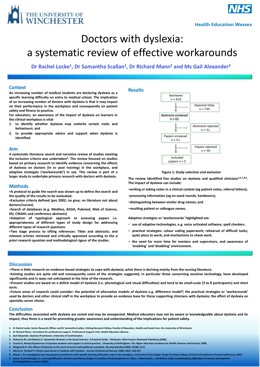Doctors With Dyslexia: Strategies and Support
Ms Gail Alexander, Ms Sharon Kibble, Dr Rachel Locke, Dr Richard Mann, Dr Samantha Scallan
Background
Looking beyond dyslexia as an individual doctor’s issue requires adjusting a working environment to better serve the needs of doctors with dyslexia. With an increasing number of doctors disclosing dyslexia at medical school, how is it best for educators to provide this support? Our research looks at the impact of dyslexia on clinical practice and the coping strategies used by doctors to minimise the effect.
Methods
Qualitative data was collected from 14 doctors with dyslexia using semi-structured interviews and by survey. ‘In situ’ demonstration interviews were conducted in order to understand how dyslexia is managed in the workplace from first-hand experience. Employers and educators who have responsibility for meeting the needs of this group were also consulted.
Findings
Even in cases of doctors who had a diagnosis, they often did not disclose their dyslexia to the employer. Study participants reported having developed individual ways of coping and devised useful ‘workarounds’. Support from employers comes in the form of ‘reasonable adjustments’ although from our data we cannot be sure that such adjustments contribute to an ‘enabling’ work environment. Supportive characteristics included the opportunity to shadow others and the time and space to complete paperwork on a busy ward.
Discussion
Doctors with dyslexia need to be helped to feel comfortable enough to disclose. Educators need to challenge any negative assumptions that exist as well as promote understanding about the elements that contribute to a positive working environment. There is practice guidance available for educators to identify strategies and resources that are evidence based.

Publications
| Publication | Year | DOI | Link | |
|---|---|---|---|---|
| The Clinical Teacher - Doctors with Dyslexia | doi.org/10.1111/tct.12578 | https://onlinelibrary.wiley.com/doi/10.1111/tct.12578 | Download file |
Conferences
| Title | Type |
|---|---|
| RCGP Conference 2016 | Poster presentation |
Related events, research and information
Clinicians with Dyslexia: A Systematic Review of Effects and Strategies
26 November 2018 – Background For educators, an awareness of the impact of dyslexia on learners in the clinical workplace is...
Having Problems?
23 March 2016 – Having Problems? Your first port of call if you are having difficulties should be your clinical or educational...
The Value of Actors to GP Trainer and Appraiser CPD
17 August 2016 – Background Actors have been used for many years in the training and formative development of doctors, as well...
Training Pre-registration House Officers in General Practice: Strategies, Needs and Barriers (Paper 1)
21 September 2016 – Summary of Work This research presents an overview of the findings of an interview-based research project that...
International Medical Graduate (IMG)
15 June 2022 – International Medical Graduate GP trainees. This page has links to useful information and resources we hope...
Fostering Resilience with GPs: A Workshop Approach
16 August 2016 – Background In recent years, change within the NHS and to the way care is delivered has seen the intensity of...
Developing NHS Leaders: The Benefits of Overseas Leadership Fellowships
11 January 2017 – Background Since 2008, 150 NHS employees and trainees from a range of healthcare professions, including...
Knows How, Shows How, Does? Assessing the Impact of Facilitated Small-Group Learning on GP Trainees’ Consultation Skills
17 August 2016 – Background Preparation for high stakes assessments such as the CSA (membership exam for the RCGP, UK) can lead...
Understanding Uncertainty
17 August 2016 – Background The ability to tolerate uncertainty allows a doctor to manage patients appropriately, and in so...
